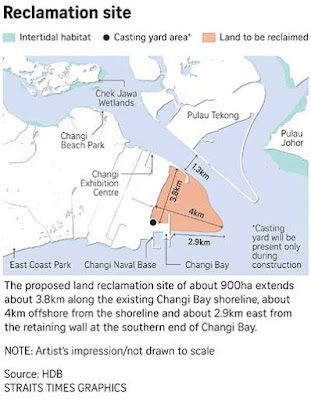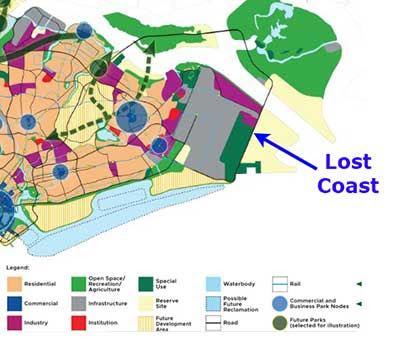Today, we saw lots of dugong feeding trails on both the southern and northern corner of this vast shore. The shore seems less lively compared to our last survey in Jun 2023, and we saw what seems to some small signs of impact from the Pasir Panjang oil spill last month.
Although the seagrasses appear less dense than before, there were still clear dugong feeding trails from the highest edge of the seagrasses to deeper waters, which was more challenging to photograph.
Dugong feeding trails are formed when dugongs chomp up seagrasses including their roots, leaving a shallow meandering furrow of about equal width and depth.
As usual, the rest of the team make all the special finds. Kelvin found a teeny tiny Fig snail and a humungous Ramose murex - probably the biggest the team has seen. Richard saw the Lavender hermit crab which we seldom see, and Rachael spotted what looks like a juvenile Crucifix swimming crab. Other special snail finds are a Vitate conch snail and another snail which we haven't figured out. Richard also saw one Common sea star. There used to be more of them here.
.jpg) |
| Collage of photos by the team. Links to their albums below. |
Our shores are currently also being impacted by mass coral bleaching. There are no corals on the sandy shores, but other cnidarians can also bleach. Fortunately, I didn't see any that were bleaching. I saw one Glass anemone, some Pearly anemones and a small Haddon's carpet anemone. I also saw many Sea pencils, they seemed okay.
The most abundant animals on the shore remain Cake sand dollars, although they seem far more sparse than the in the past. We saw a few live Thick-edged sand dollars which are not common on our shores. Also some Painted sand stars and some Remarkable sea cucumbers. Kelvin found a Lovenia heart urchin. I saw some Moon crabs but very few swimming crabs and no fishes. I didn't see any Ghost crabs today, usually we see a lot of them foraging on the shore in the dark.
Near the high shore at the low water mark, there were patches of brownish stains - often with trails of sand dollars or snails through the patch. There were also tiny specks of what seems like 'glued' together sediments washed up on the low shore. I'm not quite sure whether these are from the 400tonne Pasir Panjang oil spill on 14 Jun 2024, about a month ago. The stains and specks didn't smell of oil, and were only a little sticky.
On the high shore, a narrow line of litter is accumulating - quite 'good' for a shore that is not cleaned daily. Oil-coated marine litter means oil stays in the system for a longer time. Fortunately, not many of the plastic litter was coated in oil. But there were many single-use water cups, which commonly wash up on beaches along the ferry routes. These are not commonly used by beach goers or the local boating or fishing community. But these single-use water cups are apparently given out to passengers on ferries. It seems no facilities are provided at any of the piers/terminals under MPA's charge for vessels to responsibly dispose of trash generated during their operation. More in this post.
There was a long abandoned net on the northern edge of the shore. And I saw sudsy foam on the southern edge. But seagrasses still seemed fine, though the growths are less lush than before. Mostly Spoon seagrass (large leaves and small leaves). And I saw a sprinkling of Needle seagrass. For the first time, I also noticed many small clumps of a variety of seaweeds growing on the usually bare seaward sandy shores.
What is the fate of this shore?
In Jul 2022, it was announced that the entire Lost Coast area will be reclaimed again.

The 900ha reclamation will bury all of the 'Lost Coast' at the eastern most part of Changi.
Why?
For purposes that appear yet to be determined by the authorities. In the Long-Term Plan Review, the area is marked as 'Reserve Site'. Planned reclamation at Chek Jawa in the Plan is also marked as 'Reserve Site'.
When?
Works is ongoing, apparently started around the third quarter of 2022. It is expected to take about 5-10 years to complete the reclamation.
From Port Marine Notice 31 of 2023. Dated 14 Apr 2023 With effect from 25 Apr 2023 to 24 Oct 2023. The works involve discharging of sand by Self-Discharging Sand Carriers (SDSC) and Trailer Suction Hopper Dredger (TSHD) at Changi East Deposition Area (CEDA). Soil Investigation work will be carried out by Jack -up barge assisted by tug boat.
Today, we could see a faint large mound of sand at the work site.
 |
| Photo by Rachael Goh |
This is a photo taken from a regular plane landing at Changi Airport.
Photos by those on this survey
Kelvin Yong Part 1
Part 2
Richard Kuah
Rachael Goh
Che Cheng Neo
Tommy Tan




.jpg)
.jpg)
.jpg)
.jpg)
.jpg)
.jpg)


